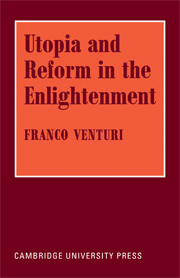II - English commonwealthmen
Published online by Cambridge University Press: 07 October 2011
Summary
If one thinks about it, the judgment of Montesquieu which I have just quoted on the incapacity of England to establish a democracy in the middle of the seventeenth century, and on the inevitable restoration of the monarchy ‘après bien des manœuvres, des chocs, et des secousses’, is less negative and disparaging than it might at first appear. It is true that Great Britain had allowed herself to be governed by men who ‘n'avaient point de vertu’. The attempts of the British to rid themselves of them had indeed been futile and disordered. But, a century after the Puritan revolution, this judgment seemed rather a detached and impartial historical observation: England, in fact, was too modern to return to the models of antiquity, and too near the modern states to be able to become a republic once more.
Montesquieu's conclusion was shared by all his contemporaries, on both sides of the Channel. On the continent, a conservative equilibrium had been attained between the ancient republics and the monarchical states by the middle of the eighteenth century. In Britain, its equivalent was the compromise, apparently more stable but substantially similar, between the monarchy and the parliament, the cities, the classes and the constituted bodies. If one remembers the great conflicts of the previous century, the problems which engaged London and the provinces in the years immediately after 1748, the naturalization of the Jews or the problem of the National Debt, for example, might well seem ripples on the surface of a great calm sea.
- Type
- Chapter
- Information
- Utopia and Reform in the Enlightenment , pp. 47 - 69Publisher: Cambridge University PressPrint publication year: 1971



